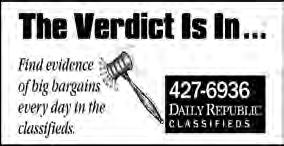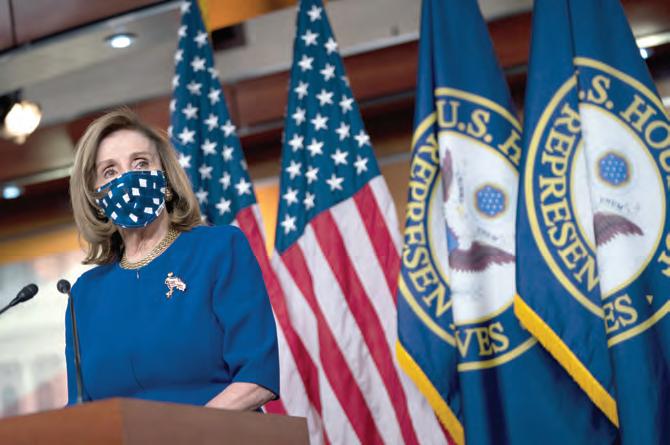
5 minute read
14 14
State’s churches ready to defy Newsom after court ruling
Tribune ConTenT AgenCy
SACRAMENTO — Greg Fairrington, pastor of a Rocklin, California, megachurch that’s been defying California’s pandemic restrictions on indoor churchgoing, opened Sunday’s service by pulling out his cell phone and reading aloud from a fresh U.S. Supreme Court decision.
“There is no world in which the Constitution tolerates a color-coded executive edict that opens liquor stores . . . and bike shops but shutters churches,” Fairrington said, quoting the opinion written by Justice Neil Gorsuch.
The pastor then looked out at his congregants at Destiny Church and shouted: “The Supreme Court of the United States of America – yeah! We have a biblical mandate and First Amendment rights!” What appeared to be a large crowd of worshippers, packed closely together, roared its approval.
Gov. Gavin Newsom’s order preventing indoor church services in much of California, a move aimed at halting the spread of Covid-19, may have hit a major legal obstacle. Last week, the Supreme Court struck down New York state’s rules that limited in-person attendance at houses of worship, declaring it was unconstitutional to severely restrict church and synagogue attendance while allowing merchants and other nonreligious institutions to welcome big crowds.
The 5-4 ruling – with the swing vote cast by President Donald Trump’s
Justin Sullivan/Getty Images/TNS file demonstrators protest California Gov. Gavin Newsom’s continued statewide shelter-in-place order outside of San Francisco City Hall, May 1, in San Francisco.
newest appointee to the court, Amy Coney Barrett – could scramble the pandemic legal landscape as coronavirus infections surge in California and elsewhere. A Pasadena church last week petitioned the Supreme Court for an injunction that would block Newsom’s rules on church gatherings.
Separately, a federal judge in Sacramento, presiding over a lawsuit filed against Newsom by a Lodi church, ordered both sides Monday to submit additional legal arguments about the potential impact of the New York case.
The New York ruling shows “the Constitution is not suspended by the virus,” said Dean Broyles, the lawyer representing Cross Culture Christian Center, the Lodi church challenging Newsom’s directives. “You’re going to see more and more churches defying the (governor’s) order.”
New York’s rules limited church attendance to 10 or 25 congregants, depending on the size of the institution. In California, indoor services are completely forbidden in counties that have been placed in the purple category – the most restrictive of the tiers. With coronavirus infections at record levels, about 99% of the state’s population, including the greater Sacramento area, lives in purple counties.
Capital Christian Center, one of the Sacramento area’s largest churches, is looking at whether it can reopen for in-person attendance in light of the Supreme Court case.
“We are taking a fresh look,” the church’s chief operations officer Jason Batt said. “We’re reading the ruling in depth.” He added that Capital Christian believes it “can safely host in-person services” but is also consulting with state and local health officials.
Leslie Jacobs, a constitutional law expert at the McGeorge School of Law in Sacramento, said the New York case doesn’t automatically toss aside California’s rules on church attendance. But it could make it harder for California to defend in court why it’s treating religious services differently “than hair salons and shopping malls,” she said.
So far, Newsom has successfully fended off all lawsuits filed over his stayat-home orders, securing court orders against churches, health clubs and other challengers.
He even won a case in the U.S. Supreme Court. In May, the court voted 5-4 to uphold rules that, at the time, allowed indoor services but limited attendance to 100 people or 25% capacity, whichever was smaller. The rules had been challenged by South Bay United Pentecostal Church in Chula Vista, near San Diego.
Chief Justice John Roberts, who sided with Newsom, said the governor’s rules were allowable in part because churches weren’t being singled out for strict regulation.
“Similar or more severe restrictions apply to comparable secular gatherings, including lectures, concerts, movie showings, spectator sports, and theatrical performances, where large groups of people gather in close proximity for extended periods of time,” Roberts wrote.
Since then, however, California’s rules on church gatherings have become considerably more restrictive – forbidding all indoor services in the purple counties.

FDA official: Emergency approval of coronavirus vaccines not guaranteed
Tribune ConTenT AgenCy
WASHINGTON — The Food and Drug Administration will not automatically authorize emergency use of coronavirus vaccines before completing a rigorous independent review, despite heightened expectations that two vaccine candidates will be available to Americans this month, Dr. Stephen Hahn, FDA commissioner, told McClatchy in an interview Tuesday.
The interview came hours before Hahn met with White House chief of staff Mark Meadows, according to an administration official, amid calls from President Donald Trump for the FDA to “act quickly” in the approval process.
The FDA is entering one of the most consequential periods in its history after two companies, Pfizer and Moderna, submitted requests for authorization of emergency use of their Covid-19 vaccine candidates. Public advisory meetings have been scheduled, and FDA scientists are reviewing internal company data “around the clock” preparing to deny or approve the applications within a matter of weeks, Hahn said.
“The urgency of the situation is a pressure that I think is substantial on all of us,” he said in the phone interview. “Our career staff recognize that and are working with great speed. But also we’ve maintained a commitment to using data and science, and we will continue to do that.”
Their reviews will not be based on public statements from the companies that say both vaccine candidates, which use similar biological platforms, demonstrated up to 95% effectiveness in advanced clinical trials.
Company results will have to be independently verified, and their safety profiles will be rigorously vetted despite company assurances that the FDA’s safety data milestones have been achieved, Hahn said.
The prospect of imminent vaccines has provided a light at the end of a dark tunnel to Americans facing uncontrolled spread of the pandemic disease and record cases, hospitalizations and deaths.
“The bottom line is we can’t determine at this point, despite the very optimistic reporting in the press and what we’ve heard,” Hahn said.
Career scientists at the FDA are reviewing raw data from the Pfizer and Moderna trials for the first time, investigating any adverse events or side effects that transpired over the course of the trials, different levels of effectiveness among populations and age groups, and whether individuals who were already infected by the coronavirus might have had any unexpected reactions to the vaccine doses.
Hahn said they will also be looking for evidence that the vaccines lead to increased respiratory infections – a concern with vaccines researched and developed for other coronaviruses – and whether the use of a relatively new method of vaccine development poses any significant risks.









